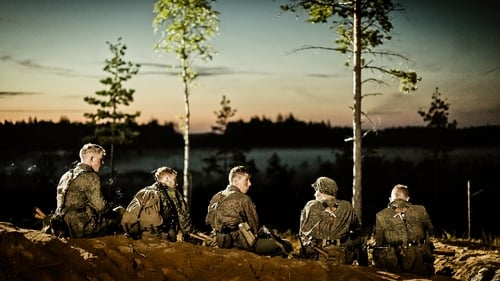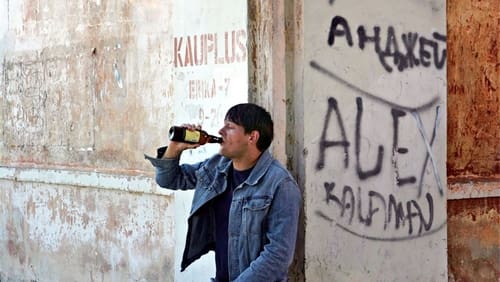
Ain Mäeots
출생 : 1971-12-25,
약력
Ain Mäeots (born 25 December 1971) is an Estonian stage, film, and television actor and stage, film, and television director and producer.
Ain Mäeots' first film role as an actor was a small role in the 2000 Mare Raidma directed short Lunastus, for Faama Film and Eesti Televisioon. In 2005, he appeared in his first feature-length film as Lembitu in the Kaaren Kaer directed comedy Malev; a skewed interpretation of Estonia's history set in the year 1208. In 2007, he made a cameo appearance in the Rain Tolk and Andres Maimik directed comedy Jan Uuspõld läheb Tartusse (English release title: 186 Kilometers), in which Estonian actor Jan Uuspõld plays a down-on-his-luck caricature of himself, trying to hitchhike from Tallinn to Tartu to perform in a role at the Vanemuine theater.
In 2008, Mäeots made his debut as a film director with the Exitfilm biography Taarka, based on the play of the same name by Kauksi Ülle about the difficult life of Seto folk singer Hilana Taarka. Taarka has the distinction of being the first feature-length film in the Seto dialect. Mäeots also made a brief appearance in the film in the role of a villager. Taarka won the 2008 Estonian Cultural Endowment Debut Award.
In 2012, he co-wrote and directed his second film, the drama Deemonid. The film chronicles the unraveling of three people who enter a casino and subsequently confronting their inner demons.
In 2013, he appeared as Erik in the Hardi Volmer directed historical melodrama feature film Elavad pildid, which follows two Estonians, a girl and a boy, born at the beginning of the 20th-century in a Baltic German manor, through the coming decades and all of the revolutions, wars, military occupations, regime collapses, and new beginnings.
In 2015, he played the role of Captain Evald Viires in the Elmo Nüganen directed war film 1944. The film is set in World War II and is shown through the eyes of Estonian soldiers who had to pick sides and thus fight against their fellow countrymen. It was selected as the Estonian entry for the Best Foreign Language Film at the 88th Academy Awards but it was not nominated. In 2019, he played the role of Joosep in the Mart Sander directed fantasy-horror film Kõhedad muinaslood.

Father
After 27-year-old Karmen's father dies, the security structures of her previous life start falling apart, as her relationship with her half-brother Viktor also deteriorates, and she faces the darkness and emptiness of the universe.

Director
The feature film based on Eduard Bornhöhe's story takes the viewer to the early days of the 20th century, when Estonia was still part of the tsarist Russia. Pride in one's nation was emerging and the desire to give something eternal to one's people at any cost - be it a miracle machine flying in the air or valuable literature written in the language of the country. Unfortunately, it was not that easy and sometimes there was lack of talent.

Joosep
An anthology of bizarre, fantastic and spooky tales from the past, present and future, dealing with curses, witches, perfect crime and science experiments.

Joosep
A young village youth in the 1840s Estonia is eager to break a curse that would free a doomed maiden from the spring - not realizing he is under the spell of a nix.

Ingrid's Boss
Artur is an Armenian guy who dreams about a career in filmmaking, but his grandfather wants him to take over the family wine business. When a bad review from an Estonian critic threatens to ruin the family business, Artur has to go to Tallinn to set things straight. There he meets the feisty Ingrid and things take an unexpected turn.

Captain Evald Viires
제2차 세계대전이 한창이던 1944년, 독일과 소련 사이에 끼어있던 에스토니아 사람들은 조금이라도 더 많은 전력을 확보하고자 하는 두 나라의 힘에 눌려 강제 징병을 당한다. 분명히 한 동포였는데도 불구하고 독일의 ‘무장 친위대’와 소련의 ‘붉은 군단’으로 나뉜 에스토니아 사람들. 총알이 빗발치는 전쟁터에서 ‘카알 토닉’은 자신과 똑 같은 이름을 갖고 있는 ‘카알’과 친구가 되지만 뒤늦게 자신들이 서로 다른 편에 서 있다는 것을 깨닫는다. 서로에게 총을 겨눌 수밖에 없는 적이 된 그들! 역사상 가장 비극적인 전투가 지금 시작된다.

Erik
The main character, Helmi, is born into the house of Baron von Strandmann in Old-Town Tallinn, in 1908. The only thing that she knows for sure about her past is that her mother was an Estonian servant girl. Everything else is a discovery during a life that runs the course of a century - a life that has quite a lot of surprises in store for Helmi. In this house she finds happiness and suffering, passion and disappointment. She grows up alongside young Erik and waits for her big love to blossom. But one floor down lives projectionist Julius - a man who is far from indifferent when it comes to Helmi. All of the biggest historical events of the century leave their mark on the house. Its hardwood floors have born soldiers' gruff boots and gentleman's shiny oxfords. Its walls have held the fates of people from far and near, foreigners and locals. Helmi's home becomes a German salon, a revolution museum, and a working class commune. And as freedom comes, real estate crooks start sniffing ...

Writer
When Joko, Ants and Reeda, all in their own good reasons, first enter a casino, they can't possibly be aware of the very existence of the demons inside them. Soon enough, they will know. But then it is already too late and their lives are suddenly caught in a fatal vortex.

Director
When Joko, Ants and Reeda, all in their own good reasons, first enter a casino, they can't possibly be aware of the very existence of the demons inside them. Soon enough, they will know. But then it is already too late and their lives are suddenly caught in a fatal vortex.

Writer
The first film in the Seto language in the world speaks about the brightest heroine of a small people, the folk singer Hilana Taarka, a woman who lived her whole life as an outcast in a small chimney-less hut; as an unmarried mother of children in poverty, begging her bread, doing odd jobs and singing. She always sang the truth, sometimes bitter, sometimes funny, sometimes cruel. She was feared, despised and coveted. Taarka sang throughout her remarkable life, throughout her fate, from a small Seto village to international fame. And she sang well. Really well. Taarka became the Mother of the Song, a legend. But as a woman, as a member of the community, the Seto people never really accepted her. Taarka - a despised woman and a worshiped singer.

Groom
The first film in the Seto language in the world speaks about the brightest heroine of a small people, the folk singer Hilana Taarka, a woman who lived her whole life as an outcast in a small chimney-less hut; as an unmarried mother of children in poverty, begging her bread, doing odd jobs and singing. She always sang the truth, sometimes bitter, sometimes funny, sometimes cruel. She was feared, despised and coveted. Taarka sang throughout her remarkable life, throughout her fate, from a small Seto village to international fame. And she sang well. Really well. Taarka became the Mother of the Song, a legend. But as a woman, as a member of the community, the Seto people never really accepted her. Taarka - a despised woman and a worshiped singer.

Director
The first film in the Seto language in the world speaks about the brightest heroine of a small people, the folk singer Hilana Taarka, a woman who lived her whole life as an outcast in a small chimney-less hut; as an unmarried mother of children in poverty, begging her bread, doing odd jobs and singing. She always sang the truth, sometimes bitter, sometimes funny, sometimes cruel. She was feared, despised and coveted. Taarka sang throughout her remarkable life, throughout her fate, from a small Seto village to international fame. And she sang well. Really well. Taarka became the Mother of the Song, a legend. But as a woman, as a member of the community, the Seto people never really accepted her. Taarka - a despised woman and a worshiped singer.

Ain Mäeots
The well-known but out-of-luck actor Jan Uuspõld sets out to hitchhike from Tallinn through Estonia to Tartu.

Lembitu
A fake historic epic on the Middle Ages and Estonia's not-so-glorious past.










